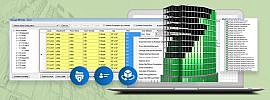
BIM Clash Detection: Key Practices and Benefits for Enhanced Project Efficiency
Introduction
Building Information Modelling (BIM) has emerged as a game-changer in the fast-evolving world of construction and design, offering innovative ways to plan, visualize, and construct complex projects. Central to the effectiveness of BIM is the concept of clash detection, a practice that ensures seamless integration of different building systems and components. This blog post delves into the critical role of BIM clash detection, its best practices, and the remarkable advantages it brings to project efficiency and success.
BIM Clash Detection: Building Smarter, Building Better
The Significance of BIM Clash Detection
The potential for conflicts is ever-present in the intricate dance of architectural, structural, mechanical, electrical, and plumbing elements that make up modern construction projects. BIM clash detection acts as a digital safeguard, identifying clashes between these systems before they manifest in the physical world.
At its core, clash detection is a proactive approach that scrutinizes the digital representation of a building – the BIM model – to identify instances where different components intersect in undesirable ways. Picture a scenario where an electrical conduit clashes with a structural beam or a plumbing line crosses a ventilation duct. If left unresolved, these clashes could lead to costly delays and rework during construction.
BIM clash detection operates within a collaborative framework, enabling stakeholders from diverse disciplines to contribute to a unified digital model. This model serves as a virtual testing ground, revealing rectified clashes before they impact the construction phase. The aim is to create a design free from conflicts, leading to smoother construction processes and heightened project efficiency.
Key Practices for Effective BIM Clash Detection
- Advanced Tools and Software Utilization: Leveraging cutting-edge BIM software like Autodesk BIM 360, Navisworks, and clash detection Revit is crucial. These tools enable comprehensive clash detection across different building systems.
- Physical Clash Detection: Identify clashes among physical components, such as electrical, plumbing, and structural elements. Detailed clash reports are generated, guiding necessary design changes.
- Functional Clash Detection: Uncover clashes that impact functionality, such as inaccessible doors due to spatial conflicts. Early identification leads to efficient design modifications.
- BIM Clash Resolution Suggestions: Merely detecting clashes is the first step. Experts utilize advanced software and design experience to resolve clashes effectively, ensuring optimal solutions.
- Design Team Collaboration: Collaboration among different teams throughout the clash detection process is essential. Expertise in various building systems allows for effective coordination and problem-solving.
- Nuanced Clash Detection: Differentiate between hard and soft clashes, addressing each type with tailored solutions. This subtle approach ensures a holistic clash resolution strategy.
- Early Multidisciplinary Collaboration: Architects, engineers, and stakeholders collaborate from the start, using BIM to identify and resolve potential clashes before they become costly.
- Rule-Based Clash Testing: Setting clear criteria for clashes, like clearances or limits, automates clash detection for consistent and reliable results.
- Continuous Model Updates: Regularly updating BIM models and running clash tests in real-time prevents unnoticed conflicts from accumulating.
Benefits of BIM Clash Detection
The adoption of BIM clash detection brings forth an array of benefits that significantly enhance the project lifecycle:
Improved Design Accuracy: Clash detection ensures that all systems work harmoniously within the design, reducing the likelihood of on-site clashes and modifications. This accuracy translates to a reduction in costly rework, keeping the project on schedule and within budget.
Time and Cost Savings: Clash detection prevents costly delays and revisions by identifying clashes before construction commences. This directly translates to time and cost savings, making projects more financially viable.
Enhanced Collaboration: Clash detection promotes effective communication and collaboration among project stakeholders. Design teams, contractors, and engineers can work together to identify and resolve issues early, fostering a culture of teamwork.
Minimized Rework: The early detection of clashes means that adjustments can be made in the digital realm, minimizing the need for physical rework on the construction site. This leads to smoother construction processes and reduced disruptions.
Staying Ahead of the Curve: Future Trends in BIM Clash Detection: As technology continues to shape the construction industry, staying informed about emerging trends is vital. The digital shift in building design and construction is accelerating, making BIM clash detection a cornerstone of efficient project delivery.
Conclusion
Empowering Precision: BIM Clash Detection Unleashed!
BIM clash detection is a pivotal practice in modern construction. Identifying clashes early prevents disruptions, reduces rework, and enhances overall project efficiency. From improved design accuracy to enhanced collaboration, the benefits are substantial. As construction projects embrace technology-driven solutions, BIM clash detection remains crucial for success.
Take advantage of the advantages that BIM clash detection offers. Contact experts like IndiaCADworks to learn more about their BIM clash detection services and ensure your projects are streamlined, efficient, and poised for success.











